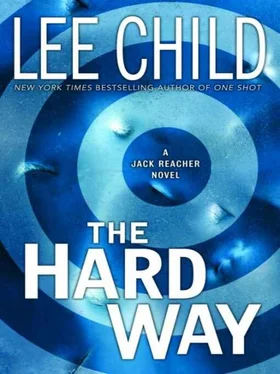
The tenth book in the Jack Reacher series
For Katie and Jess:
Two sweet sisters
JACK REACHER ORDEREDespresso, double, no peel, no cube, foam cup, no china, and before it arrived at his table he saw a man’s life change forever. Not that the waiter was slow. Just that the move was slick. So slick, Reacher had no idea what he was watching. It was just an urban scene, repeated everywhere in the world a billion times a day: A guy unlocked a car and got in and drove away. That was all.
But that was enough.
The espresso had been close to perfect, so Reacher went back to the same café exactly twenty-four hours later. Two nights in the same place was unusual for Reacher, but he figured great coffee was worth a change in his routine. The café was on the west side of Sixth Avenue in New York City, in the middle of the block between Bleecker and Houston. It occupied the ground floor of an undistinguished four-story building. The upper stories looked like anonymous rental apartments. The café itself looked like a transplant from a back street in Rome. Inside it had low light and scarred wooden walls and a dented chrome machine as hot and long as a locomotive, and a counter. Outside there was a single line of metal tables on the sidewalk behind a low canvas screen. Reacher took the same end table he had used the night before and chose the same seat. He stretched out and got comfortable and tipped his chair up on two legs. That put his back against the café’s outside wall and left him looking east, across the sidewalk and the width of the avenue. He liked to sit outside in the summer, in New York City. Especially at night. He liked the electric darkness and the hot dirty air and the blasts of noise and traffic and the manic barking sirens and the crush of people. It helped a lonely man feel connected and isolated both at the same time.
He was served by the same waiter as the night before and ordered the same drink, double espresso in a foam cup, no sugar, no spoon. He paid for it as soon as it arrived and left his change on the table. That way he could leave exactly when he wanted to without insulting the waiter or bilking the owner or stealing the china. Reacher always arranged the smallest details in his life so he could move on at a split second’s notice. It was an obsessive habit. He owned nothing and carried nothing. Physically he was a big man, but he cast a small shadow and left very little in his wake.
He drank his coffee slowly and felt the night heat come up off the sidewalk. He watched cars and people. Watched taxis flow north and garbage trucks pause at the curbs. Saw knots of strange young people heading for clubs. Watched girls who had once been boys totter south. Saw a blue German sedan park on the block. Watched a compact man in a gray suit get out and walk north. Watched him thread between two sidewalk tables and head inside to where the café staff was clustered in back. Watched him ask them questions.
The guy was medium height, not young, not old, too solid to be called wiry, too slight to be called heavy. His hair was gray at the temples and cut short and neat. He kept himself balanced on the balls of his feet. His mouth didn’t move much as he talked. But his eyes did. They flicked left and right tirelessly. The guy was about forty, Reacher guessed, and furthermore Reacher guessed he had gotten to be about forty by staying relentlessly aware of everything that was happening around him. Reacher had seen the same look in elite infantry veterans who had survived long jungle tours.
Then Reacher’s waiter turned suddenly and pointed straight at him. The compact man in the gray suit stared over. Reacher stared back, over his shoulder, through the window. Eye contact was made. Without breaking it the man in the suit mouthed thank you to the waiter and started back out the way he had entered. He stepped through the door and made a right inside the low canvas screen and threaded his way down to Reacher’s table. Reacher let him stand there mute for a moment while he made up his mind. Then he said “Yes” to him, like an answer, not a question.
“Yes what?” the guy said back.
“Yes whatever,” Reacher said. “Yes I’m having a pleasant evening, yes you can join me, yes you can ask me whatever it is you want to ask me.”
The guy scraped a chair out and sat down, his back to the river of traffic, blocking Reacher’s view.
“Actually I do have a question,” he said.
“I know,” Reacher said. “About last night.”
“How did you know that?” The guy’s voice was low and quiet and his accent was flat and clipped and British.
“The waiter pointed me out,” Reacher said. “And the only thing that distinguishes me from his other customers is that I was here last night and they weren’t.”
“You’re certain about that?”
“Turn your head away,” Reacher said. “Watch the traffic.”
The guy turned his head away. Watched the traffic.
“Now tell me what I’m wearing,” Reacher said.
“Green shirt,” the British guy said. “Cotton, baggy, cheap, doesn’t look new, sleeves rolled to the elbow, over a green T-shirt, also cheap and not new, a little tight, untucked over flat-front khaki chinos, no socks, English shoes, pebbled leather, brown, not new, but not very old either, probably expensive. Frayed laces, like you pull on them too hard when you tie them. Maybe indicative of a self-discipline obsession.”
“OK,” Reacher said.
“OK what?”
“You notice things,” Reacher said. “And I notice things. We’re two of a kind. We’re peas in a pod. I’m the only customer here now who was also here last night. I’m certain of that. And that’s what you asked the staff. Had to be. That’s the only reason the waiter would have pointed me out.”
The guy turned back.
“Did you see a car last night?” he asked.
“I saw plenty of cars last night,” Reacher said. “This is Sixth Avenue.”
“A Mercedes Benz. Parked over there.” The guy twisted again and pointed on a slight diagonal at a length of empty curb by a fire hydrant on the other side of the street.
Reacher said, “Silver, four-door sedan, an S-420, New York vanity plates starting OSC, a lot of city miles on it. Dirty paint, scuffed tires, dinged rims, dents and scrapes on both bumpers.”
The guy turned back again.
“You saw it,” he said.
“It was right there,” Reacher said. “Obviously I saw it.”
“Did you see it leave?”
Reacher nodded. “Just before eleven forty-five a guy got in and drove it away.”
“You’re not wearing a watch.”
“I always know what time it is.”
“It must have been closer to midnight.”
“Maybe,” Reacher said. “Whatever.”
“Did you get a look at the driver?”
“I told you, I saw him get in and drive away.”
The guy stood up.
“I need you to come with me,” he said. Then he put his hand in his pocket. “I’ll buy your coffee.”
“I already paid for it.”
“So let’s go.”
“Where?”
“To see my boss.”
“Who’s your boss?”
“A man called Lane.”
“You’re not a cop,” Reacher said. “That’s my guess. Based on observation.”
“Of what?”
“Your accent. You’re not American. You’re British. The NYPD isn’t that desperate.”
“Most of us are Americans,” the British guy said. “But you’re right, we’re not cops. We’re private citizens.”
Читать дальше













